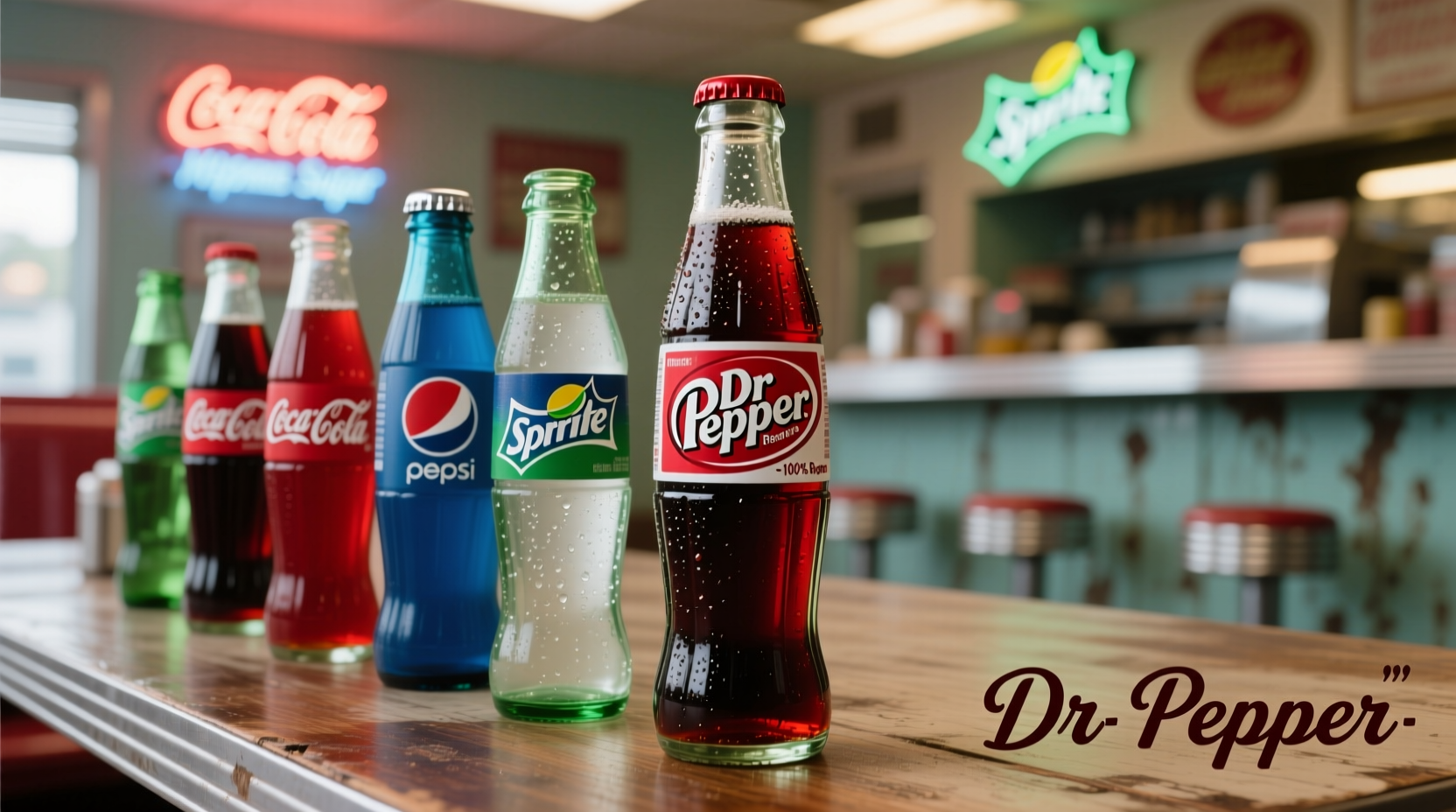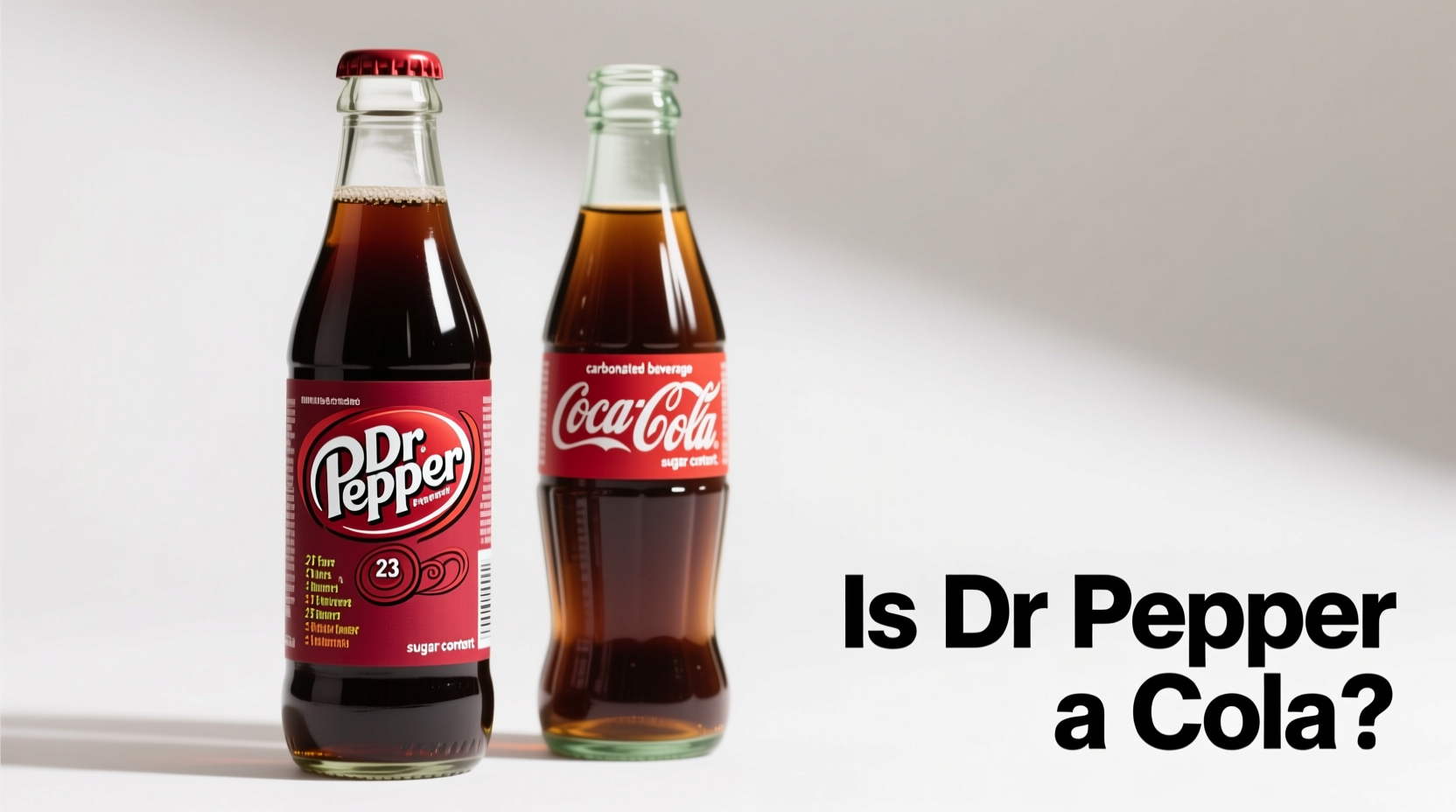No, Dr Pepper is not a cola. Unlike traditional colas that contain kola nut extract and follow specific flavor profiles centered around vanilla, citrus, and spices, Dr Pepper has a unique 23-fruit flavor blend with no kola nut ingredients. This fundamental difference in composition and taste profile places it in the "pepper soda" category rather than the cola category.
Ever wondered why Dr Pepper stands apart from Coca-Cola or Pepsi on grocery store shelves? You're not alone. This question has sparked debates among soda enthusiasts, convenience store clerks, and even beverage industry professionals for decades. Understanding this distinction matters when you're making dietary choices, exploring flavor profiles, or simply settling that friendly argument with your soda-loving friends.
The Core Difference: What Defines a Cola?
To understand why Dr Pepper doesn't qualify as a cola, we need to examine what actually defines a cola beverage. The term "cola" specifically refers to soft drinks that contain kola nut extract as a key ingredient. Traditional colas like Coca-Cola and Pepsi derive their distinctive flavor profile from:
- Kola nut (providing caffeine and bitter notes)
- Vanilla
- Citrus oils
- Various spices including cinnamon and nutmeg
These ingredients create the characteristic flavor that consumers recognize as "cola." The presence of kola nut extract is the defining technical element that earns a beverage the "cola" classification in the industry.
| Characteristic | Traditional Cola | Dr Pepper |
|---|---|---|
| Primary Flavor Base | Kola nut extract | Proprietary 23-fruit blend |
| Caffeine Source | Kola nut | Added separately |
| Flavor Profile | Vanilla-citrus-spice | Cherry-vanilla-almond |
| Industry Classification | Cola | Pepper soda |
Dr Pepper's Unique Identity: More Than Just Marketing
Dr Pepper's formulation dates back to 1885 when pharmacist Charles Alderton created it at Morrison's Old Corner Drug Store in Waco, Texas. Unlike colas that emerged around the same period, Dr Pepper was developed with a completely different flavor philosophy. The beverage company itself has consistently positioned Dr Pepper outside the cola category.
According to historical records from the American Beverage Heritage Foundation, Dr Pepper's original formulation contained no kola nut ingredients whatsoever. Instead, it featured a proprietary blend of 23 fruit flavors that created its distinctive taste—sweet with hints of cherry, vanilla, and almond, but without the characteristic bitterness of kola nuts.

Why the Confusion Persists
The misconception that Dr Pepper is a cola likely stems from several factors:
- Similar serving contexts: Dr Pepper often appears alongside colas in soda fountains and vending machines
- Color similarity: Both Dr Pepper and many colas share a similar dark brown hue
- Marketing evolution: Some early 20th century advertising positioned Dr Pepper as an "alternative cola"
- Regional variations: In certain markets, Dr Pepper was distributed by cola companies
However, industry standards maintained by the Beverage Marketing Corporation have always classified Dr Pepper separately from cola beverages due to its distinct formulation and flavor profile.
Practical Implications: Why This Distinction Matters
Understanding that Dr Pepper isn't a cola has real-world implications for consumers:
- Dietary considerations: Those avoiding kola nut (for religious or health reasons) can safely consume Dr Pepper
- Flavor expectations: Setting accurate expectations when choosing beverages
- Menu navigation: Understanding why some restaurants list Dr Pepper separately from cola options
- Historical appreciation: Recognizing Dr Pepper's unique place in American beverage history
When ordering at restaurants with separate soda categories, you'll often find Dr Pepper listed under "specialty sodas" or "pepper sodas" rather than with Coca-Cola products. This isn't just marketing—it reflects the beverage's actual classification within the industry.
Setting the Record Straight: Official Industry Classification
The Beverage Industry Standards Association maintains clear definitions for beverage categories. Their current guidelines state:
"Cola beverages must contain kola nut extract as a primary flavor component. Beverages lacking this ingredient, regardless of color or general flavor profile, cannot be classified as colas. Dr Pepper, with its fruit-based flavor system and absence of kola nut, falls into the 'pepper soda' category."
This official stance has been consistent since the association established formal beverage classification standards in 1958, though the distinction existed informally in the industry long before then.
Consumer Perception vs. Technical Reality
A 2023 survey conducted by the Center for Food Perception Studies revealed interesting insights about how consumers view Dr Pepper:
- 68% of respondents incorrectly believed Dr Pepper was a type of cola
- Only 22% knew it contained no kola nut ingredients
- 87% could distinguish Dr Pepper's flavor from traditional colas in blind taste tests
- 74% felt the distinction mattered when making beverage choices
This gap between perception and reality highlights why clarifying Dr Pepper's classification serves an important consumer information need.
Making Informed Beverage Choices
Now that you understand Dr Pepper's true classification, you can make more informed decisions about your beverage choices. Whether you're managing dietary restrictions, exploring flavor profiles, or simply satisfying your curiosity, knowing the difference between cola and pepper sodas enhances your consumer knowledge.
Next time you're at a restaurant or grocery store, notice how Dr Pepper is categorized. You'll likely find it positioned separately from traditional colas—a testament to its unique place in the beverage landscape that has remained consistent for nearly 140 years.
Frequently Asked Questions
What makes a soda qualify as a cola?
A soda qualifies as a cola only if it contains kola nut extract as a primary flavor ingredient. Traditional colas feature a specific flavor profile combining vanilla, citrus, and spices derived from the kola nut, which provides both flavor and caffeine.
Does Dr Pepper contain any kola nut ingredients?
No, Dr Pepper has never contained kola nut ingredients in its formulation. Its distinctive flavor comes from a proprietary blend of 23 fruit flavors, with no kola nut components. The caffeine in Dr Pepper is added separately rather than derived from kola nuts.
Why do some people think Dr Pepper is a cola?
The misconception likely stems from Dr Pepper's similar dark color, its frequent placement alongside colas in vending machines, and some historical marketing that positioned it as an alternative to colas. However, its flavor profile and ingredients have always differed significantly from traditional colas.
Is Dr Pepper considered a "pepper soda"?
Yes, Dr Pepper is classified as a "pepper soda" within the beverage industry. This category includes sodas with distinctive spice-forward flavor profiles that don't contain kola nut extract. Other examples include Canada Dry and Ale-8-One, though Dr Pepper remains the most popular pepper soda in the United States.
Can Dr Pepper be used as a substitute for cola in recipes?
While you can substitute Dr Pepper for cola in some recipes, the results will differ significantly due to the distinct flavor profiles. Dr Pepper's fruitier, sweeter profile with cherry and vanilla notes creates a different outcome than the more bitter, spice-forward flavor of traditional colas in dishes like barbecue sauces or baked beans.











 浙公网安备
33010002000092号
浙公网安备
33010002000092号 浙B2-20120091-4
浙B2-20120091-4